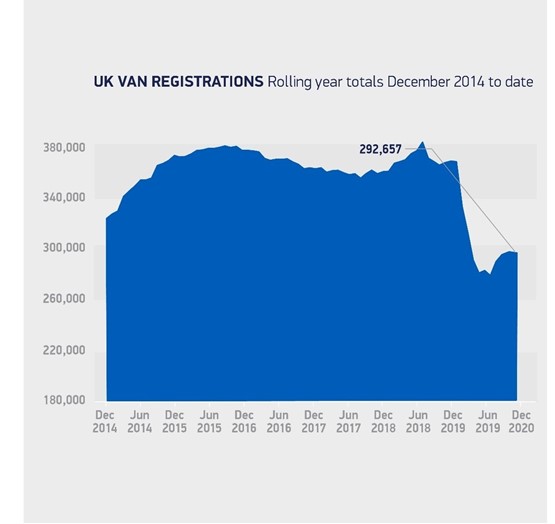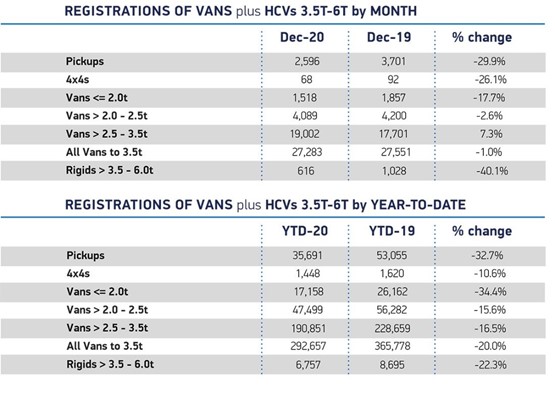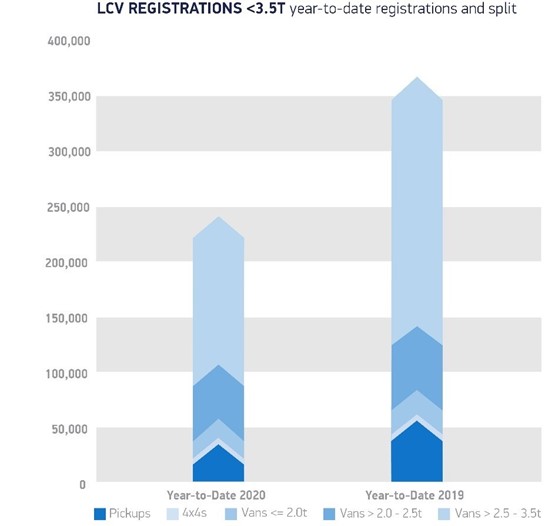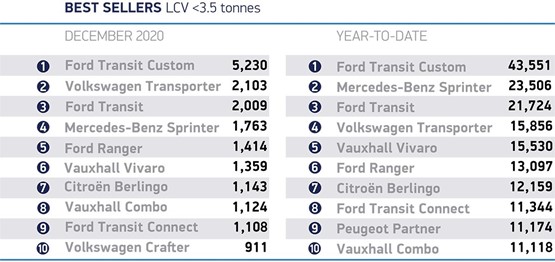New van registrations declined by 20% last year, according to the latest figures from the Society of Motor Manufacturers and Traders (SMMT).
In total 292,657 vehicles were registered in 2020, with sales affected by the Coronavirus pandemic and uncertainty around Brexit.
Throughout the year the LCV market responded to fluctuating demand, flexing to adjust as lockdown measures affected consumer behavior and business operations. Despite this, 2020 was the first sub-300,000-unit year since 2013 with a shortfall of more than 73,000 costing to the sector of some £2 billion.

Mike Hawes, SMMT chief executive, said: “It’s been a truly extraordinary and testing year for the commercial vehicle sector. From keeping services running, to getting key workers, goods and medicines from A to B, manufacturers and operators alike have adapted to multiple unpredictable challenges.
“Undeniably the LCV market, having shrunk by a fifth, has a lot of hurdles to overcome as we enter 2021. However, investment in fleet renewal will be key to driving recovery, and the sector’s resilience, now coupled with added clarity over UK-EU trading relations and the rollout of vaccines, offers hope for both the van market and the wider economy.”
All van segments saw a decrease in the year, with small vans weighing less than or equal to 2.0 tonnes down by 34.4%, medium vans weighing more than 2.0-2.5 tonnes down 15.6% and larger vans weighing more than 2.5-3.5 tonnes down 16.5%.
Demand for new pickups and 4x4s fell by 32.7% and 10.6% respectively.
 In the final month of 2020, van sales were only 1% behind December 2019’s performance.
In the final month of 2020, van sales were only 1% behind December 2019’s performance.
Demand for further online deliveries in December bolstered sales and registrations of LCVs weighing 2.5 – 3.5 tonnes driving an increase of 7.3%, with 1,300 units more than the previous year.
Demand for lower capacity light commercials was down across all sectors in December, however, indicating the reluctance of semi-retail and self-employed to invest in new vehicles at a challenging time for their businesses.
A further potential factor highlighted by the SMMT that slowed the market at the end of the year was the fact that orders for new vehicles not in the UK could have been affected by EU tariffs had a free-trade deal not been agreed at the end of December.
“December is always a turbulent month for LCV registrations with private and self-employed buyers holding back to have their van registered in the new year to protect residual values, therefore a decline of just -1% was not unexpected”, said Sue Robinson, chief executive of the National Franchised Dealers Association (NFDA) which represents franchised car and commercial vehicle dealers in the UK.

Overall, the Ford Transit Custom (pictured) was the UK's most popular van in 2020. It achieved some 43,551 registrations giving it a lead of 20,000 sales over the second-placed Mercedes-Benz Sprinter. The 'regular' Transit occupies third place in the sales chart, with 21,724 registrations, while the Transit Connect was the eighth best-seller in 2020.























Login to comment
Comments
No comments have been made yet.